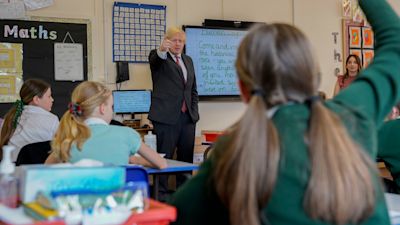Disadvantaged pupils will find it 'impossible to catch up' unless 2021 exams change, NEU warns

It will be "almost impossible" for disadvantaged children to catch up with their peers in their GCSEs and A-levels in the upcoming school year unless "bigger changes" are made to the exams process, the National Education Union (NEU) has warned.
The majority of GCSE and A-level students will have been out of schooling for more than five months when they return in September, however children from more advantaged backgrounds are more likely to have had access to various forms of education while outside of school.
Dr Mary Bousted, the joint General Secretary of the NEU, told ITV News that disadvantaged children who have not had access to the internet, or laptops, or tutoring during the coronavirus crisis will find it "almost impossible" to catch up "through no fault of their own".
She said her union is "concerned that the education attainment gap between the more advantaged pupils and less advantaged pupils will be wider" unless GCSEs and A-levels are "altered to reflect that reality".
The NEU is demanding a reduction in the amount of content assessed in 2021’s GCSE and A-level exams.
It wants the government to work with teachers to develop a “robust” system for moderated centre-assessed grades and commission an independent review into the assessment methods for GCSEs and A-levels.
The NEU is concerned that future local lockdowns could result in schools being forced to close, a situation that would "disproportionately" affect disadvantaged children.
In a joint letter to the education secretary, Dr Bousted and joint General Secretary Kevin Courtney urged Education Secretary Gavin Williamson to prepare for new spikes in coronavirus that could lead to “further loss of schooling”.
They said the controversy around last week’s A-level results “must never happen again” and are demanding changes to exams in 2021 which ensure grades “properly recognise and reward”.
In the letter, they said: “It is clear to the National Education Union that government needs to make much bigger changes to next year’s exams in order to build confidence that the grades awarded, upon which young people’s life chances are determined, properly recognise and reward their achievements.
“You should be working, now, to examine different possible scenarios and to develop contingency plans in case of further school and college closures.”
They added: “The current over-reliance on end of course exams increases student anxiety and fails to give a fair reflection of what students can achieve.
"All options should be considered to ensure that young people are rewarded for their achievements, supported to fulfil their potential and not held back due to their background.”
It comes after the Department for Education has said it has "full confidence" in exams regulator Ofqual ahead of GCSE results day on Thursday, despite Mr Williamson on Tuesday appearing to shift blame for the A-levels results fiasco onto the watchdog.
Mr Williamson on Tuesday said Ofqual "didn't deliver" after hundreds of thousands of A-level students were left disappointed by their results, which were downgraded by an algorithm.
But as GCSE students await their results, the DfE said: "We have full confidence in Ofqual and its leadership in their role as independent regulator and we continue to work closely with Ofqual to deliver fair results for our young people at this unprecedented time."
The government stood by what Boris Johnson said were "robust" results before it performed a u-turn, allowing students to use the grades their teachers predicted for them.
Since then, it has been announced that GCSE students will not have their results downgraded when they are revealed on Thursday.
The DfE said the Ofqual decision "to move from moderated grades to centre assessed grades was one that we agreed with".
It added: "Our focus remains on working with Ofqual to ensure students receive their final GCSE, AS level and A-level results this week so that they can move on to the next stage of their lives.”
The statement signals a change in tack from Mr Williamson, who in a series of interviews on Tuesday suggested the exams watchdog was to blame for the A-levels debacle.
When asked on LBC radio if Ofqual had “failed”, Mr Williamson said: “We ended up in a situation where Ofqual didn’t deliver the system that we had been reassured and believed that would be in place.”
Labour shadow university minister Emma Hardy said said it was "completely unfair" to "throw Ofqual under the bus to hide their own incompetence".
She said the government should have scrutinised the assurances it was given by Ofqual about its calculation process.
"The very idea that they just took reassurances and shrugged and said 'OK that's fine' and waited for the catastrophe to happen is frankly appalling."
In order to save GCSE students facing a similar situation, Mr Williamson has said youngsters will receive whatever grade is highest, either the grades predicted by their teachers or the algorithm-based result.